Related Research Articles

Salaspils is a town in Latvia, the administrative centre of Salaspils Municipality. The town is situated on the northern bank of the Daugava river, 18 kilometers to the south-east of the city of Riga.

The ArajsKommando, led by SS commander and Nazi collaborator Viktors Arājs, was a unit of Latvian Auxiliary Police subordinated to the German Sicherheitsdienst (SD). It was a notorious killing unit during the Holocaust.

Riga Hydroelectric Power Plant is located just beyond Riga's southern border. It is geographically located in the town of Salaspils. Total installed power generating capacity is 402 MW. There are six generators, two transformers and two 330 kV power lines.
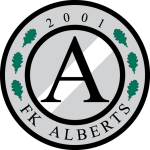
Futbola klubs Alberts is a Latvian football club, that plays in the Latvian Second League, the third-highest league of Latvian football. The club was founded in 2001 and named after Alberts Šeibelis, Latvia national football team captain before World War II. Originally it was from the city of Riga. From 2008 to 2014 the team played its home matches at Carnikava, but from the 2016 season they play at Salaspils.
The possible elm cultivar Ulmus 'Jalaica' hails from the Baltic states. Living specimens are grown in the arboretum at the National Botanic Garden of Latvia, Salaspils, introduced in 1998 from the Tallinn Botanic Garden and the plantarium OPU Tallinn, Estonia. It was assumed the word 'Jalaica' was the name given the cultivar, but it has since emerged that the word simply means 'Elm' in Estonian, and the trees donated may not in fact be cultivars, although of rather unusual appearance.
Ulmus laevisvar.simplicidens is a variety of the European white elm which exists at the National Botanic Garden of Latvia in Salaspils; it was obtained from St. Petersburg, Russia, in 1964.
Ulmus × arbusculaE. Wolf [: "bushy" ] is a putative hybrid of Ulmus scabra and Ulmus pumila raised from seed collected from a large wych elm in the St. Petersburg Botanic Garden in 1902. A similar crossing was cloned ('FL025') by the Istituto per la Protezione delle Piante (IPP), Florence, as part of the Italian elm breeding programme circa 2000.
Konrāds Kalējs was a Latvian soldier who was a Nazi collaborator and an alleged war criminal during World War II. He gained notoriety for evading calls for his prosecution across four countries, more than once under the threat of deportation.
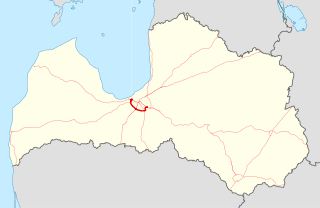
The A5 is a national road in Latvia which is part beltway around Riga, connecting Salaspils to Babīte. The road is also known as Riga bypass. The road is part of European route E67, European route E77 and Latvian TEN-T road network. The length of A5 is 41 kilometer. Currently A5 has 1x1 lanes until interchange with A9 then it turns to 2x2 all the way until Babīte. Most of the traffic on A5 is made up by trucks. A5 crosses river Daugava on Riga HES, and the A5 part on the HES has been reconstructed in 2010/2011. Another part of A5 between A8 and A9 was reconstructed in 2011. There are plans to build a new bridge over Daugava opposite to the end of A4, in further future. Current speed limit is 90 km/h. The average AADT of A5 in 2016 was 12 482 cars per day.
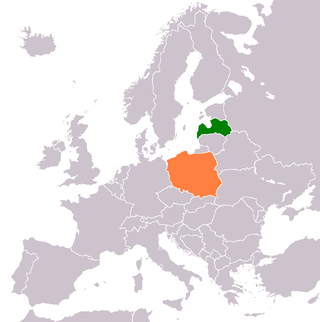
Latvia–Poland relations are foreign relations between Latvia and Poland. Both countries enjoy good relations and are close allies. There are around 57,000 Poles living in Latvia.

Salaspils Municipality is a municipality in Vidzeme, Latvia. The municipality was formed in 2004 by reorganization of Salaspils town and its rural territory, the administrative centre being Salaspils. In 2010 the rural territory was renamed Salaspils parish. The population in 2020 was 22,758.

Salaspils camp was established at the end of 1941 at a point 18 km (11 mi) southeast of Riga (Latvia), in Salaspils. The Nazi bureaucracy drew distinctions between different types of camps. Officially, it was the Salaspils Police Prison and Re-Education Through Labor Camp. It was also known as camp Kurtenhof after the German name for the city of Salaspils.
The Latvian Football Cup 2010–11 was the 69th edition of the Latvian football knockout tournament. The winners will qualify for the second qualifying round of the UEFA Europa League 2011–12.

The Latvian Environment, Geology and Meteorology Centre is a governmental service under the Ministry of Environmental Protection and Regional Development of Latvia.
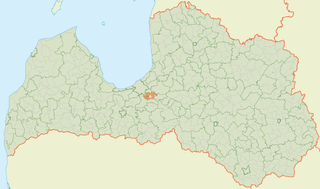
Salaspils Parish is an administrative unit of the Salaspils Municipality, Latvia. It was created in 2010 from the rural territory of Salaspils town. At the beginning of 2014, the population of the parish was 5329.
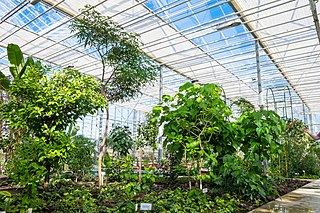
The National Botanic Garden of Latvia is a botanical garden in Salaspils, Latvia. It is one of the largest botanical gardens in the Baltic states.
The 2017 Latvian Football Cup was the 23rd edition of the tournament that began on 28 May 2017 and ended on 18 October 2017. The winner of this season's cup earned a place in the first qualifying round of the 2018–19 Europa League.

SK Super Nova is a Latvian professional football club based in Riga. It was founded in 2000, and it has been involved in various levels of the Latvian football league system, including the top-tier Latvian Higher League and lower divisions. The team was based in Salaspils from 2022 till the end of 2023 season and returned to Riga in 2024.
The 2024 Latvian First League was the 33rd season of second-tier football in Latvia. The season started on 5 April 2024 and finished on 10 November 2024.
